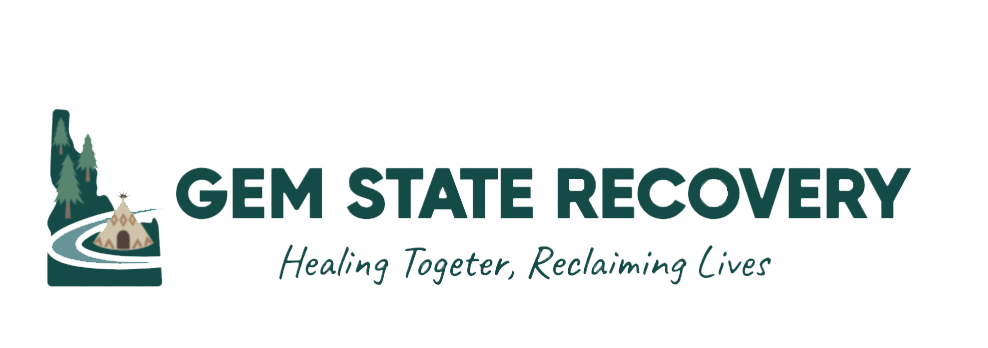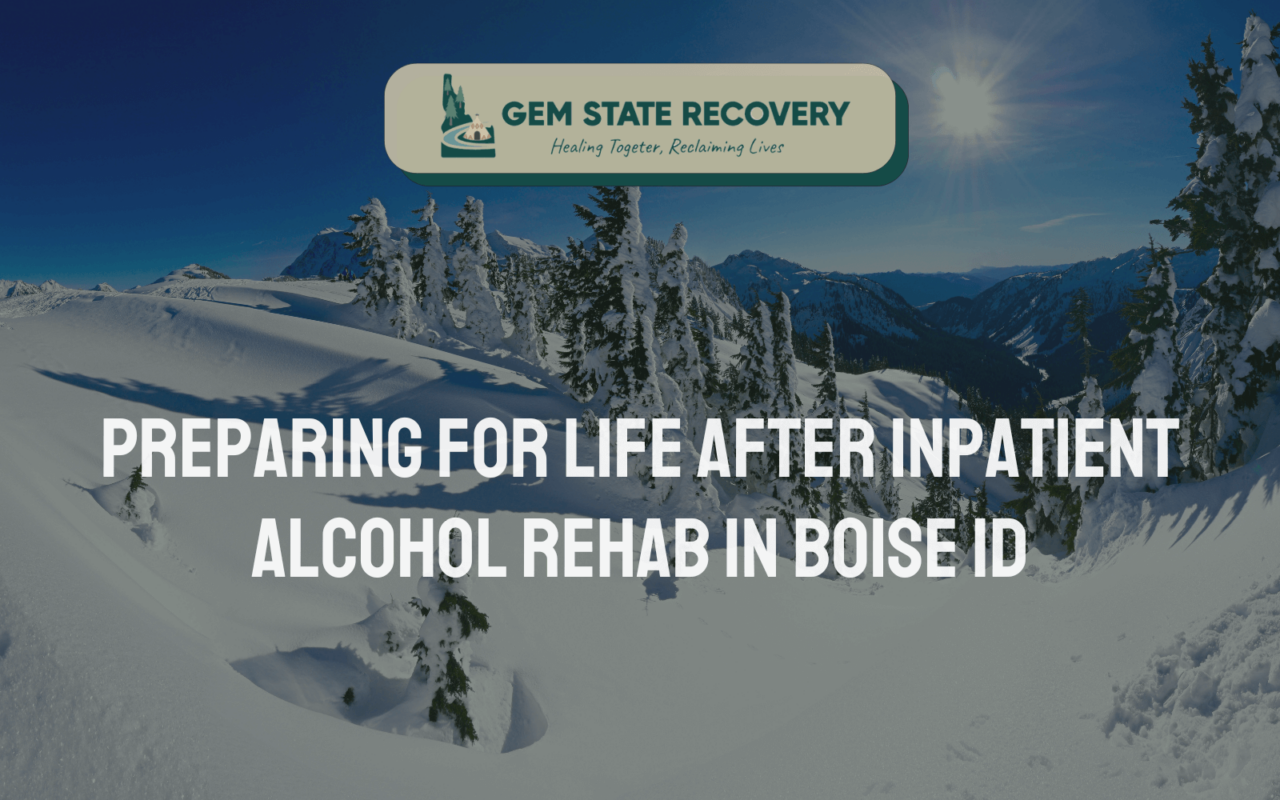Successfully completing an inpatient alcohol rehab in Boise ID is a significant achievement. You’ve invested time and energy into learning new coping mechanisms, confronting past trauma, and gaining the support necessary to heal. However, the real work begins when you leave the controlled environment of inpatient rehab and step into the world of everyday life. The transition can be daunting, but it’s also an opportunity for growth, change, and personal renewal.
At Gem State Recovery, we understand that the journey of recovery doesn’t end when you leave the treatment center. In fact, life after rehab is just as important as the work you’ve done during your inpatient stay. How you handle this transition can make a big difference in your long-term recovery success. That’s why we’ve created this guide to help you prepare for life after inpatient alcohol rehab in Boise ID, and beyond.
Understanding the Challenges of Transitioning from Inpatient Alcohol Rehab
When you leave an inpatient alcohol rehab in Boise, ID, you are stepping into a completely new world—a world filled with both challenges and opportunities. The safe, structured environment of rehab, where routines are carefully designed to support your recovery, is very different from the freedom and unpredictability of real life. This transition can feel daunting at first, and it’s normal to feel overwhelmed. However, with the right mindset, preparation, and support, this shift can become a powerful launching pad for a healthier, more fulfilling life.
What Makes the Transition Hard?
While in rehab, you’re in a bubble of support, shielded from the demands, triggers, and stressors of everyday living. Once you leave that environment, you’ll encounter new challenges that require strength and resilience to navigate. Some of the most common hurdles include:
- External Triggers: People, places, and events tied to your past drinking habits don’t magically disappear when you leave rehab. These triggers—such as a favorite bar, certain social groups, or even specific routines—can still exist in your life and may tempt you to revert to old patterns. Learning to identify and avoid or navigate these triggers is crucial for maintaining your sobriety. Strategies such as creating a new social circle, finding alcohol-free activities, or setting firm boundaries with others can go a long way in helping you stay on track.
- Stress and Emotional Regulation: Everyday stressors, from work deadlines to family obligations, can feel much heavier as you work to stay sober. In rehab, you learned coping skills to manage these emotions, but applying them outside of the protected environment can be a challenge. Stress can become a major trigger if not managed properly, so it’s important to continue practicing what you’ve learned—whether it’s mindfulness, journaling, seeking therapy, or finding healthy outlets like exercise or creative hobbies.
- Relapse Temptations: After inpatient rehab, the temptation to relapse can creep up in many forms. Friends or family members who don’t fully understand your journey might unintentionally pressure you to drink. Work events, holidays, or social gatherings can also present challenges. On top of external pressures, feelings of loneliness, isolation, or self-doubt may arise, making it harder to maintain your sobriety. Preparing for these moments in advance and building a strong support system, such as attending AA meetings or working with a sponsor, can make a significant difference.
How to Prepare for Success
Understanding these challenges is the first step toward preparing for life after rehab. Awareness allows you to create strategies and safeguards to overcome these hurdles. For example, establishing a daily routine can help you maintain structure and stability, while building a network of supportive friends and professionals ensures you have people to lean on when times get tough. Staying connected to aftercare programs, therapy, or support groups can also provide the accountability and encouragement you need to stay sober.
Leaving rehab is not the end of your recovery journey—it’s just the beginning. With patience, determination, and the right tools, you can navigate this transition and create a new, healthier chapter in your life.
Building Your Support System: The Cornerstone of Long-Term Sobriety
One of the most crucial aspects of life after an inpatient alcohol rehab in Boise ID is building and maintaining a strong support system. Recovery is a lifelong journey, and having people who understand, encourage, and support you can make all the difference.
1. Reconnect with Family and Friends
After spending time in rehab, you’ll want to reconnect with family and friends who support your recovery. Strong relationships with positive influences can provide emotional security as you transition back into everyday life. These people can offer encouragement, celebrate your successes, and be a source of comfort when things get tough.
However, some relationships may need to be redefined. If there are family members or friends who continue to enable unhealthy behavior or pressure you to drink, it’s essential to establish boundaries and limit contact with them. It’s okay to put your recovery first.
2. Join a Support Group or 12-Step Program
Group support is incredibly beneficial in the early stages of post-rehab life. Consider attending regular meetings of Alcoholics Anonymous (AA) or SMART Recovery in Boise. These groups provide a safe, nonjudgmental environment to talk about your struggles and receive advice from others who have been through similar experiences.
Being part of a group gives you accountability and a sense of community—two key components of successful long-term recovery. Many people in AA or SMART Recovery form lasting friendships that help them stay sober.
3. Stay Connected with Your Rehab Team
After leaving an inpatient alcohol rehab in Boise ID, it’s essential to stay in touch with your rehab team. Most rehab centers offer aftercare programs, including outpatient therapy and counseling, that can help you transition back into daily life. Gem State Recovery is proud to offer a range of aftercare services designed to support you as you navigate life after rehab.
Having consistent contact with your counselor or therapist ensures that you have a professional to lean on when you encounter difficulties. These professionals can help you process emotions, handle stress, and stay on track with your sobriety goals.

Creating and Maintaining a Structured Routine
One of the most effective ways to ensure your success after inpatient rehab is to maintain a structured routine. Rehab provides structure that helps you stay focused, and continuing that structure in your daily life will help you stay sober.
1. Establish a Daily Schedule
Creating a daily schedule that includes time for work, self-care, socializing, and hobbies is essential for your recovery. Without a schedule, you might find yourself bored, stressed, or overwhelmed—states that can lead to relapse.
- Morning: Start your day with a morning routine that includes meditation, exercise, or journaling to set a positive tone for the day.
- Afternoon: Make time for productive activities such as work, volunteering, or education. Stay engaged and connected.
- Evening: Wind down with activities like reading, light exercise, or spending time with supportive family members.
Having a routine gives you something to look forward to every day and helps you stay disciplined in your recovery.
2. Set Long-Term and Short-Term Goals
Setting goals is vital for creating direction and purpose in your life. Your goals should reflect your new priorities—staying sober, building relationships, improving your mental and physical health, and making meaningful contributions to society.
- Short-Term Goals: These might include staying sober for a certain number of days, attending therapy regularly, or learning a new skill.
- Long-Term Goals: Consider where you want to be in the next year or five years. Do you want to further your education, get a job, or start a new hobby?
Remember to break your goals down into smaller, manageable steps, and celebrate each achievement, no matter how small.
Managing Triggers and Avoiding Relapse
Triggers are an unavoidable part of life after inpatient alcohol rehab in Boise ID. Whether it’s stress, a difficult relationship, or the sight of alcohol, you will likely encounter situations that make you want to drink. The key is knowing how to handle these triggers before they lead to relapse.
1. Identify and Avoid Common Triggers
Many people in recovery find that certain situations or people act as triggers for drinking. It could be an old drinking buddy, a particular bar, or a stressful job situation. The best way to handle triggers is to anticipate them and make a plan for how to respond.
- People: If someone in your life continues to encourage unhealthy behavior or doesn’t respect your sobriety, it’s okay to limit or eliminate contact.
- Places: Avoid bars, parties, or places where alcohol is the focus.
- Emotions: Stress, loneliness, or anger can trigger cravings. Learn coping mechanisms such as deep breathing, mindfulness, or physical exercise to manage these emotions without resorting to drinking.
2. Develop Healthy Coping Mechanisms
Rather than drinking when faced with stress or emotional pain, practice coping techniques you learned during rehab. Some useful techniques include:
- Exercise: Physical activity releases endorphins, which can improve your mood and reduce cravings.
- Meditation or Yoga: Mindfulness practices can help you stay grounded and focused on the present moment.
- Journaling: Writing down your thoughts and emotions can be a powerful tool for self-reflection and emotional release.
By using these techniques, you can stay in control and prevent relapse before it starts.
Seeking Professional Help and Aftercare
Even after completing an inpatient alcohol rehab program in Boise, ID, the journey to recovery doesn’t end there. Many people find that ongoing professional help is essential to successfully transition back into everyday life. Recovery is a lifelong process, and having the right support in place can make all the difference. Therapy, outpatient care, and additional resources can provide the tools and guidance needed to maintain sobriety and overcome challenges.
- Outpatient Therapy: Continuing therapy on an outpatient basis allows you to receive personalized care while rebuilding your life outside of rehab. This approach helps address lingering issues, develop coping strategies, and navigate triggers in real time, all while integrating back into your routine.
- Medication-Assisted Treatment (MAT): For some individuals, MAT can be a game-changer in managing cravings and stabilizing recovery. By combining FDA-approved medications with counseling, this approach reduces the risk of relapse and supports long-term success.
- Aftercare Programs: Many rehab centers offer structured aftercare programs that include support groups, regular counseling sessions, and check-ins with recovery specialists. These programs are designed to provide accountability, encouragement, and guidance as you move forward.
At Gem State Recovery, we understand that every individual’s needs are unique. That’s why we offer comprehensive aftercare programs tailored to support your recovery journey. Whether you require continued therapy, the connection of support groups, or one-on-one guidance from a sober coach, we’re committed to helping you thrive in your new, healthier lifestyle. Recovery is possible, and you don’t have to face it alone.
Living a Fulfilling Life After Rehab
Once you’ve addressed the immediate challenges of maintaining sobriety, it’s time to focus on creating a fulfilling, purpose-driven life.
1. Discover New Hobbies and Passions
When you’re no longer focused on drinking, you have the freedom to explore new interests. Whether it’s learning to play an instrument, joining a fitness class, or volunteering, these activities can help you feel fulfilled and engaged.
2. Build Meaningful Relationships
Forming strong, sober relationships is essential for maintaining a healthy lifestyle. Seek out people who share your values, and make time for those who support your recovery.
3. Give Back to the Community
Giving back to others can be incredibly rewarding. Consider volunteering or mentoring others who are on a similar recovery journey. Helping others not only benefits them, but it also reinforces your commitment to staying sober.
Conclusion: Life After Inpatient Alcohol Rehab in Boise ID
Life after inpatient alcohol rehab in Boise ID is an exciting yet challenging time. It’s a time to rediscover yourself, confront old habits, and build a new future. While the road to recovery is never without its obstacles, you have the strength and support to succeed.
At Gem State Recovery, we are committed to supporting you at every stage of your journey. Whether you’re just leaving rehab or have been sober for years, our services and resources are here to help you live your best, sober life.
Remember, recovery is a journey—not a destination. Take it one day at a time, and keep moving forward. With the right tools, support, and mindset, you can build the life you deserve. Visit our website https://gemstaterecovery.com/ or call us at (208) 314-3107.





